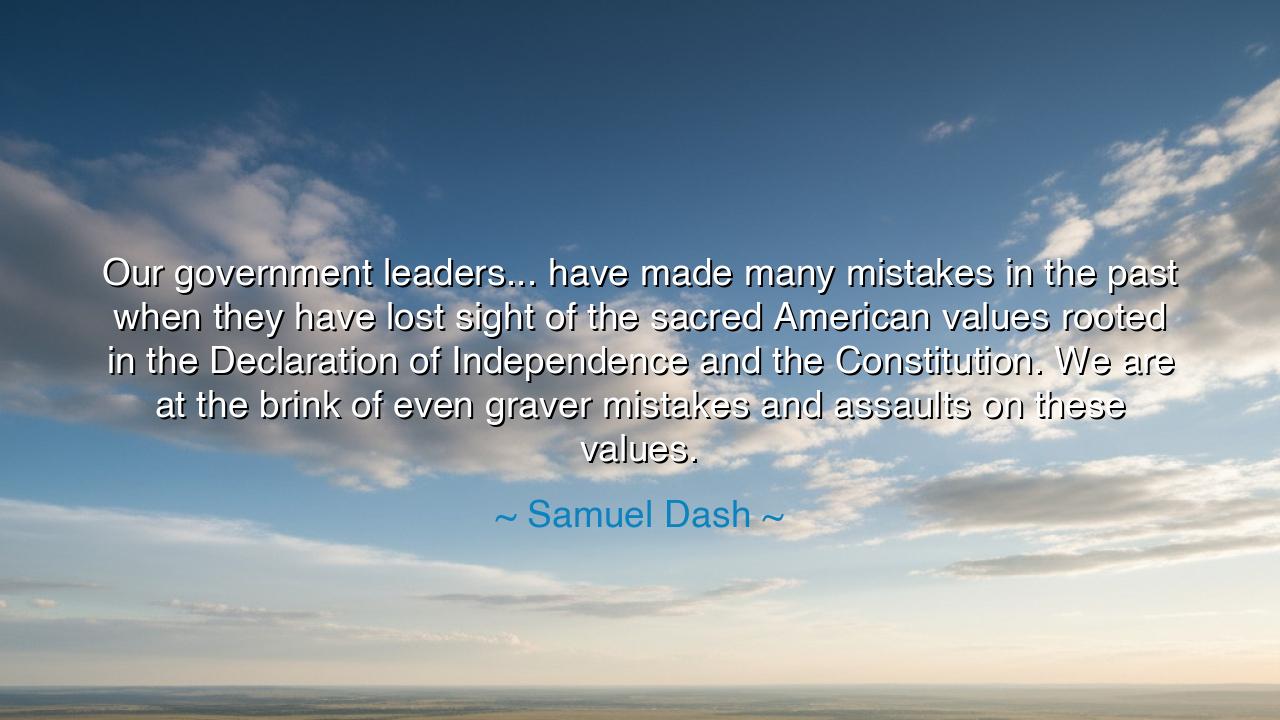
Our government leaders... have made many mistakes in the past
Our government leaders... have made many mistakes in the past when they have lost sight of the sacred American values rooted in the Declaration of Independence and the Constitution. We are at the brink of even graver mistakes and assaults on these values.






Hear now the warning voice of Samuel Dash, the great jurist and moral witness of the twentieth century, who once said: “Our government leaders... have made many mistakes in the past when they have lost sight of the sacred American values rooted in the Declaration of Independence and the Constitution. We are at the brink of even graver mistakes and assaults on these values.” These words ring not merely as a critique of his age, but as an eternal admonition to every generation that governs or is governed: when a people forget their founding principles, the pillars of their freedom begin to crumble.
Dash’s words were forged in a time of political turmoil. As chief counsel during the Watergate hearings, he bore witness to corruption at the highest levels of power — a moment when the sacred trust between the rulers and the ruled was nearly broken. He spoke not as a partisan, but as a guardian of the republic’s conscience. In his eyes, the crisis was not only about lawbreaking; it was about betrayal — a betrayal of the ideals written in the Declaration of Independence and embodied in the Constitution, those sacred covenants between the people and the state. His warning, therefore, was not for his own time alone, but for all who would forget that liberty without morality is a house built on sand.
To lose sight of those American values, Dash reminded us, is to forget the moral heart of democracy. The Declaration proclaims that all are created equal, that government derives its power from the consent of the governed, and that its purpose is to secure the rights of its citizens. The Constitution, in turn, binds power within the limits of justice, creating not tyranny but balance. When leaders ignore these foundations, when ambition or fear outweighs principle, the republic begins its slow descent — not in sudden collapse, but in quiet corrosion. The ancients too understood this truth. The fall of Athens, the decay of Rome, the tyranny of later empires — all began when leaders placed themselves above the laws they were sworn to uphold.
Dash’s words echo like the voice of Cicero before the Roman Senate, pleading for the preservation of the Republic. He saw how easily liberty can be eroded under the guise of necessity, how fear, power, and complacency can turn free institutions into instruments of domination. His mention of “graver mistakes” was not hyperbole — it was prophecy. For every age faces its own temptation to trade freedom for security, justice for expedience, truth for comfort. The guardians of liberty, therefore, must remain ever awake, for tyranny does not always arrive with swords and banners — sometimes, it comes with silence and paperwork.
Consider the story of James Madison, the architect of the Constitution, who warned that the greatest danger to a republic lies not in foreign invasion, but in the decay of public virtue. Madison knew that written laws are lifeless without the spirit of integrity to animate them. So too did Dash, who sought to awaken that spirit in his time — to remind his nation that its strength lies not in wealth, nor armies, nor even in power, but in the moral restraint and accountability of its leaders. When those charged with guarding freedom become careless with its sacred trust, the people themselves must rise to restore it.
Thus, the meaning of Dash’s warning is both grave and hopeful. Grave, because it reveals how fragile freedom is — how easily it can be undone by neglect. Hopeful, because it reminds us that vigilance and courage can yet preserve it. The Declaration and the Constitution are not relics; they are living testaments, calling each generation to measure itself against their ideals. To defend them is not the duty of leaders alone, but of every citizen who believes that truth and justice are the lifeblood of democracy.
Let this, then, be the lesson: freedom endures only when watched over by conscience. When governments forget their sacred foundations, it is the task of the people to remind them. Speak truth when others fall silent. Demand integrity where power seeks ease. Let not cynicism replace hope, nor apathy replace action. For as Dash warned, the brink of error is always near — but so too is the chance for renewal. The republic lives only so long as its people remember why it was born — to defend the sacred values of liberty, equality, and justice that form the heart of a truly independent and moral nation.






AAdministratorAdministrator
Welcome, honored guests. Please leave a comment, we will respond soon